Hai-Tao Zheng
Victor
Read As Human: Compressing Context via Parallelizable Close Reading and Skimming
Feb 02, 2026Abstract:Large Language Models (LLMs) demonstrate exceptional capability across diverse tasks. However, their deployment in long-context scenarios is hindered by two challenges: computational inefficiency and redundant information. We propose RAM (Read As HuMan), a context compression framework that adopts an adaptive hybrid reading strategy, to address these challenges. Inspired by human reading behavior (i.e., close reading important content while skimming less relevant content), RAM partitions the context into segments and encodes them with the input query in parallel. High-relevance segments are fully retained (close reading), while low-relevance ones are query-guided compressed into compact summary vectors (skimming). Both explicit textual segments and implicit summary vectors are concatenated and fed into decoder to achieve both superior performance and natural language format interpretability. To refine the decision boundary between close reading and skimming, we further introduce a contrastive learning objective based on positive and negative query-segment pairs. Experiments demonstrate that RAM outperforms existing baselines on multiple question answering and summarization benchmarks across two backbones, while delivering up to a 12x end-to-end speedup on long inputs (average length 16K; maximum length 32K).
Length-Adaptive Interest Network for Balancing Long and Short Sequence Modeling in CTR Prediction
Jan 27, 2026Abstract:User behavior sequences in modern recommendation systems exhibit significant length heterogeneity, ranging from sparse short-term interactions to rich long-term histories. While longer sequences provide more context, we observe that increasing the maximum input sequence length in existing CTR models paradoxically degrades performance for short-sequence users due to attention polarization and length imbalance in training data. To address this, we propose LAIN(Length-Adaptive Interest Network), a plug-and-play framework that explicitly incorporates sequence length as a conditioning signal to balance long- and short-sequence modeling. LAIN consists of three lightweight components: a Spectral Length Encoder that maps length into continuous representations, Length-Conditioned Prompting that injects global contextual cues into both long- and short-term behavior branches, and Length-Modulated Attention that adaptively adjusts attention sharpness based on sequence length. Extensive experiments on three real-world benchmarks across five strong CTR backbones show that LAIN consistently improves overall performance, achieving up to 1.15% AUC gain and 2.25% log loss reduction. Notably, our method significantly improves accuracy for short-sequence users without sacrificing longsequence effectiveness. Our work offers a general, efficient, and deployable solution to mitigate length-induced bias in sequential recommendation.
EvoConfig: Self-Evolving Multi-Agent Systems for Efficient Autonomous Environment Configuration
Jan 23, 2026Abstract:A reliable executable environment is the foundation for ensuring that large language models solve software engineering tasks. Due to the complex and tedious construction process, large-scale configuration is relatively inefficient. However, most methods always overlook fine-grained analysis of the actions performed by the agent, making it difficult to handle complex errors and resulting in configuration failures. To address this bottleneck, we propose EvoConfig, an efficient environment configuration framework that optimizes multi-agent collaboration to build correct runtime environments. EvoConfig features an expert diagnosis module for fine-grained post-execution analysis, and a self-evolving mechanism that lets expert agents self-feedback and dynamically adjust error-fixing priorities in real time. Empirically, EvoConfig matches the previous state-of-the-art Repo2Run on Repo2Run's 420 repositories, while delivering clear gains on harder cases: on the more challenging Envbench, EvoConfig achieves a 78.1% success rate, outperforming Repo2Run by 7.1%. Beyond end-to-end success, EvoConfig also demonstrates stronger debugging competence, achieving higher accuracy in error identification and producing more effective repair recommendations than existing methods.
TangramPuzzle: Evaluating Multimodal Large Language Models with Compositional Spatial Reasoning
Jan 23, 2026Abstract:Multimodal Large Language Models (MLLMs) have achieved remarkable progress in visual recognition and semantic understanding. Nevertheless, their ability to perform precise compositional spatial reasoning remains largely unexplored. Existing benchmarks often involve relatively simple tasks and rely on semantic approximations or coarse relative positioning, while their evaluation metrics are typically limited and lack rigorous mathematical formulations. To bridge this gap, we introduce TangramPuzzle, a geometry-grounded benchmark designed to evaluate compositional spatial reasoning through the lens of the classic Tangram game. We propose the Tangram Construction Expression (TCE), a symbolic geometric framework that grounds tangram assemblies in exact, machine-verifiable coordinate specifications, to mitigate the ambiguity of visual approximation. We design two complementary tasks: Outline Prediction, which demands inferring global shapes from local components, and End-to-End Code Generation, which requires solving inverse geometric assembly problems. We conduct extensive evaluation experiments on advanced open-source and proprietary models, revealing an interesting insight: MLLMs tend to prioritize matching the target silhouette while neglecting geometric constraints, leading to distortions or deformations of the pieces.
LexSemBridge: Fine-Grained Dense Representation Enhancement through Token-Aware Embedding Augmentation
Aug 25, 2025Abstract:As queries in retrieval-augmented generation (RAG) pipelines powered by large language models (LLMs) become increasingly complex and diverse, dense retrieval models have demonstrated strong performance in semantic matching. Nevertheless, they often struggle with fine-grained retrieval tasks, where precise keyword alignment and span-level localization are required, even in cases with high lexical overlap that would intuitively suggest easier retrieval. To systematically evaluate this limitation, we introduce two targeted tasks, keyword retrieval and part-of-passage retrieval, designed to simulate practical fine-grained scenarios. Motivated by these observations, we propose LexSemBridge, a unified framework that enhances dense query representations through fine-grained, input-aware vector modulation. LexSemBridge constructs latent enhancement vectors from input tokens using three paradigms: Statistical (SLR), Learned (LLR), and Contextual (CLR), and integrates them with dense embeddings via element-wise interaction. Theoretically, we show that this modulation preserves the semantic direction while selectively amplifying discriminative dimensions. LexSemBridge operates as a plug-in without modifying the backbone encoder and naturally extends to both text and vision modalities. Extensive experiments across semantic and fine-grained retrieval tasks validate the effectiveness and generality of our approach. All code and models are publicly available at https://github.com/Jasaxion/LexSemBridge/
GMSA: Enhancing Context Compression via Group Merging and Layer Semantic Alignment
May 18, 2025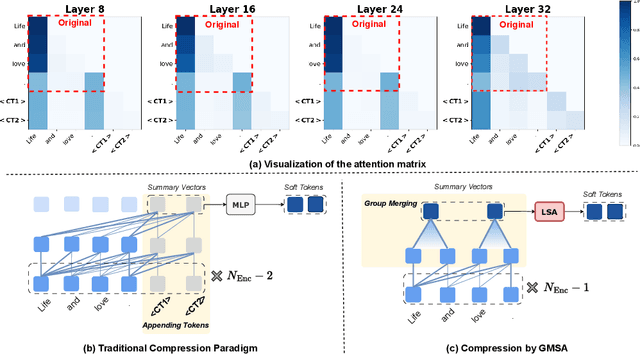
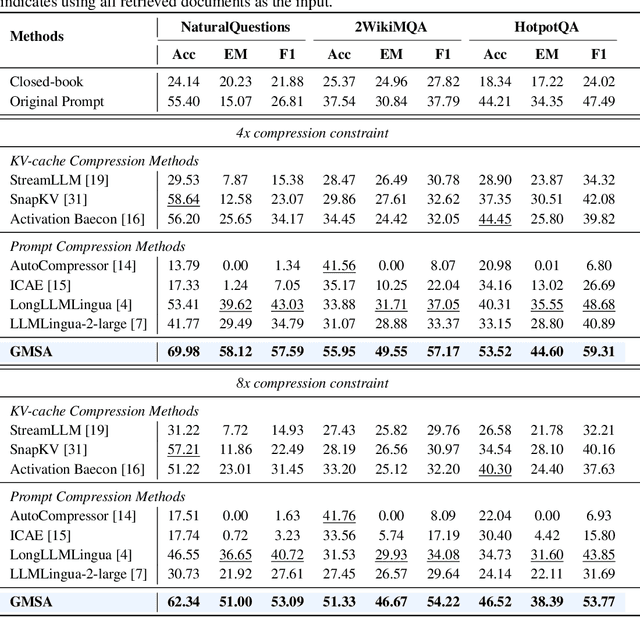
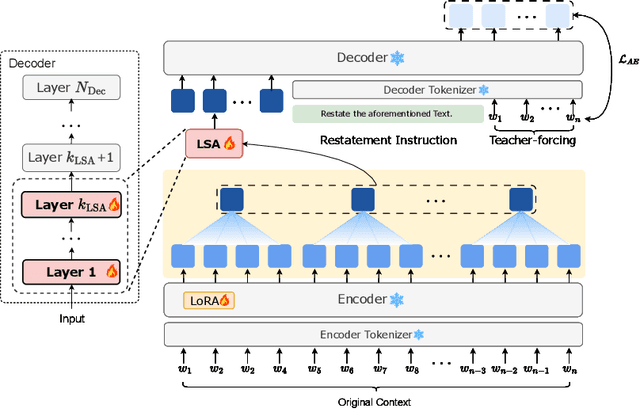
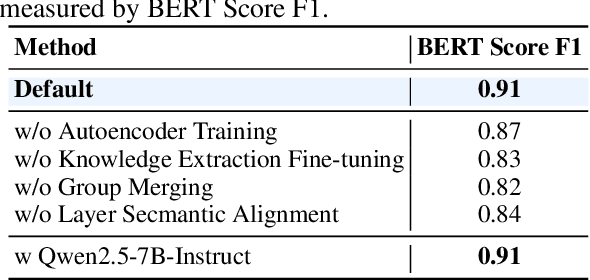
Abstract:Large language models (LLMs) have achieved impressive performance in a variety of natural language processing (NLP) tasks. However, when applied to long-context scenarios, they face two challenges, i.e., low computational efficiency and much redundant information. This paper introduces GMSA, a context compression framework based on the encoder-decoder architecture, which addresses these challenges by reducing input sequence length and redundant information. Structurally, GMSA has two key components: Group Merging and Layer Semantic Alignment (LSA). Group merging is used to effectively and efficiently extract summary vectors from the original context. Layer semantic alignment, on the other hand, aligns the high-level summary vectors with the low-level primary input semantics, thus bridging the semantic gap between different layers. In the training process, GMSA first learns soft tokens that contain complete semantics through autoencoder training. To furtherly adapt GMSA to downstream tasks, we propose Knowledge Extraction Fine-tuning (KEFT) to extract knowledge from the soft tokens for downstream tasks. We train GMSA by randomly sampling the compression rate for each sample in the dataset. Under this condition, GMSA not only significantly outperforms the traditional compression paradigm in context restoration but also achieves stable and significantly faster convergence with only a few encoder layers. In downstream question-answering (QA) tasks, GMSA can achieve approximately a 2x speedup in end-to-end inference while outperforming both the original input prompts and various state-of-the-art (SOTA) methods by a large margin.
VLM as Policy: Common-Law Content Moderation Framework for Short Video Platform
Apr 21, 2025Abstract:Exponentially growing short video platforms (SVPs) face significant challenges in moderating content detrimental to users' mental health, particularly for minors. The dissemination of such content on SVPs can lead to catastrophic societal consequences. Although substantial efforts have been dedicated to moderating such content, existing methods suffer from critical limitations: (1) Manual review is prone to human bias and incurs high operational costs. (2) Automated methods, though efficient, lack nuanced content understanding, resulting in lower accuracy. (3) Industrial moderation regulations struggle to adapt to rapidly evolving trends due to long update cycles. In this paper, we annotate the first SVP content moderation benchmark with authentic user/reviewer feedback to fill the absence of benchmark in this field. Then we evaluate various methods on the benchmark to verify the existence of the aforementioned limitations. We further propose our common-law content moderation framework named KuaiMod to address these challenges. KuaiMod consists of three components: training data construction, offline adaptation, and online deployment & refinement. Leveraging large vision language model (VLM) and Chain-of-Thought (CoT) reasoning, KuaiMod adequately models video toxicity based on sparse user feedback and fosters dynamic moderation policy with rapid update speed and high accuracy. Offline experiments and large-scale online A/B test demonstrates the superiority of KuaiMod: KuaiMod achieves the best moderation performance on our benchmark. The deployment of KuaiMod reduces the user reporting rate by 20% and its application in video recommendation increases both Daily Active User (DAU) and APP Usage Time (AUT) on several Kuaishou scenarios. We have open-sourced our benchmark at https://kuaimod.github.io.
A Hierarchical Framework for Measuring Scientific Paper Innovation via Large Language Models
Apr 20, 2025Abstract:Measuring scientific paper innovation is both important and challenging. Existing content-based methods often overlook the full-paper context, fail to capture the full scope of innovation, and lack generalization. We propose HSPIM, a hierarchical and training-free framework based on large language models (LLMs). It introduces a Paper-to-Sections-to-QAs decomposition to assess innovation. We segment the text by section titles and use zero-shot LLM prompting to implement section classification, question-answering (QA) augmentation, and weighted novelty scoring. The generated QA pair focuses on section-level innovation and serves as additional context to improve the LLM scoring. For each chunk, the LLM outputs a novelty score and a confidence score. We use confidence scores as weights to aggregate novelty scores into a paper-level innovation score. To further improve performance, we propose a two-layer question structure consisting of common and section-specific questions, and apply a genetic algorithm to optimize the question-prompt combinations. Comprehensive experiments on scientific conference paper datasets show that HSPIM outperforms baseline methods in effectiveness, generalization, and interpretability.
From Token to Line: Enhancing Code Generation with a Long-Term Perspective
Apr 10, 2025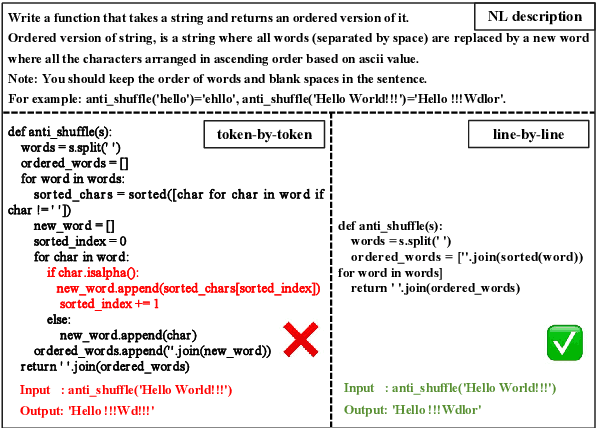
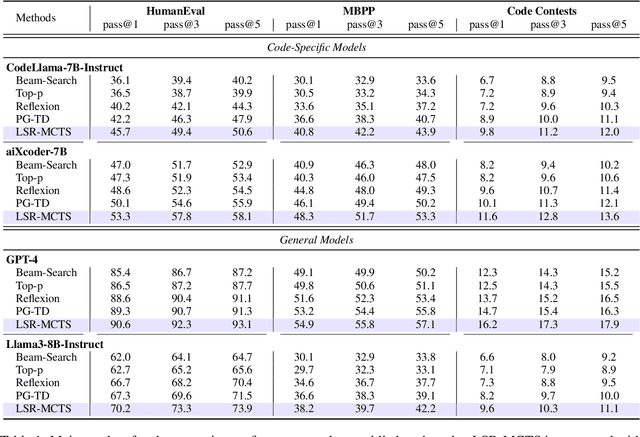
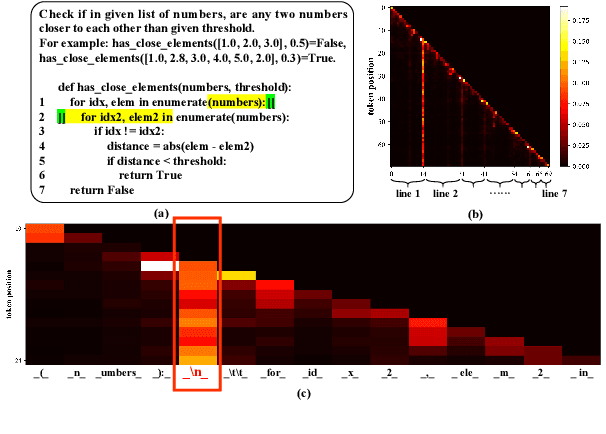
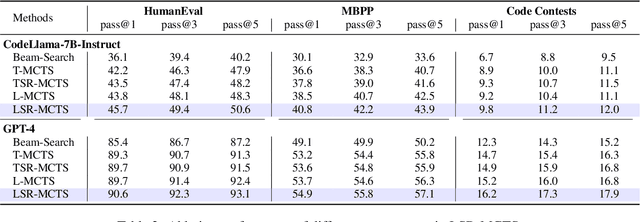
Abstract:The emergence of large language models (LLMs) has significantly promoted the development of code generation task, sparking a surge in pertinent literature. Current research is hindered by redundant generation results and a tendency to overfit local patterns in the short term. Although existing studies attempt to alleviate the issue by adopting a multi-token prediction strategy, there remains limited focus on choosing the appropriate processing length for generations. By analyzing the attention between tokens during the generation process of LLMs, it can be observed that the high spikes of the attention scores typically appear at the end of lines. This insight suggests that it is reasonable to treat each line of code as a fundamental processing unit and generate them sequentially. Inspired by this, we propose the \textbf{LSR-MCTS} algorithm, which leverages MCTS to determine the code line-by-line and select the optimal path. Further, we integrate a self-refine mechanism at each node to enhance diversity and generate higher-quality programs through error correction. Extensive experiments and comprehensive analyses on three public coding benchmarks demonstrate that our method outperforms the state-of-the-art performance approaches.
MDIT: A Model-free Data Interpolation Method for Diverse Instruction Tuning
Apr 09, 2025Abstract:As Large Language Models (LLMs) are increasingly applied across various tasks, instruction tuning has emerged as a critical method for enhancing model performance. However, current data management strategies face substantial challenges in generating diverse and comprehensive data, restricting further improvements in model performance. To address this gap, we propose MDIT, a novel model-free data interpolation method for diverse instruction tuning, which generates varied and high-quality instruction data by performing task interpolation. Moreover, it contains diversity-based clustering strategies to ensure the diversity of the training data. Extensive experiments show that our method achieves superior performance in multiple benchmark tasks. The LLMs finetuned with MDIT show significant improvements in numerous tasks such as general question answering, math reasoning, and code generation. MDIT offers an efficient and automatic data synthetic method, generating diverse instruction data without depending on external resources while expanding the application potential of LLMs in complex environments.
 Add to Chrome
Add to Chrome Add to Firefox
Add to Firefox Add to Edge
Add to Edge